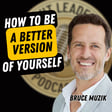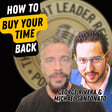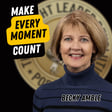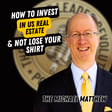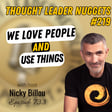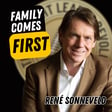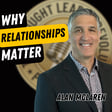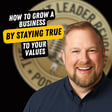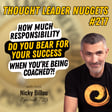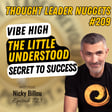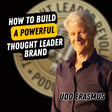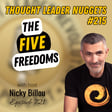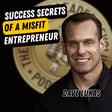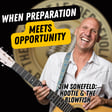
EP648: Amos McCoy - Leadership Lessons From The Hit TV Series Band Of Brothers
“When you deliver a message, 90% of what somebody gets out of that message is not what you say.”
Effective leadership is built on the foundation of clear communication, resilience, and the ability to navigate change with confidence. Strong leaders understand that communication isn’t just about delivering information—it’s about creating connections, fostering understanding, and ensuring that messages resonate with clarity and purpose. Poor communication can lead to misunderstandings, disengagement, and significant financial loss within organizations.
Amos McCoy was raised in small-town Pennsylvania, mentored by everyone from auctioneers to war heroes, and shockingly successful without ever earning a college degree—because, as it turns out, common sense isn’t something you get with a diploma. Amos shares stories about grit, resilience, and why having your mother’s employer as your first mentor teaches you more about life than any MBA program ever could. He’s navigated corporate chaos, turned organizational meltdowns into masterclasses, and proves that real leadership isn’t about knowing everything—it’s about learning from everyone.
Amos in the founder of McCoy Leadership where he teaches “leadership without the fluff.” Hailing from small-town Pennsylvania, he turned lessons from cleaning houses with his mom and life chats with historical legends into a consulting empire. With zero degrees and a PhD in real-world experience, Amos helps businesses calm the chaos, connect better, and—most importantly—stop losing money because someone couldn’t communicate beyond emojis.
Expert action steps:
1. Understand How You Communicate: Learn how you can adapt your communication style to connect effectively with different types of people, ensuring that your message is clearly heard and understood.
2. Explore New Technologies: Regularly seek out and experiment with new technologies. Take advantage of free trials to understand how they can improve efficiency and free up more time for meaningful tasks like effective communication.
3. Review Your Strategic Plan Daily: Reflect on your strategic goals every day to ensure consistent progress. Regular check-ins help prevent stagnation and keep you aligned with your long-term objectives.
Learn more and connect:
1. McCoy Leadership Website:
https://www.mccoyleadership.com
1. “Band of Brothers” by Stephen E. Ambrose
2. “Beyond Band Of Brothers” by Mjr. Dick Winters
Visit https://www.eCircleAcademy.com and book a success call with Nicky to take your practice to the next level.

